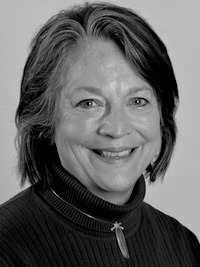Judith G. Hall
Judith Goslin Hall (1939 – ) pediatrician and clinical geneticist and dysmorphologist.
Involved in paediatric education, health care delivery for children, child advocacy issues, gender issues, international paediatric health and paediatric physician resource planning.
Research interests are in the areas of human congenital anomalies, mechanisms of disease, the natural history of genetic disorders, arthrogryposis and monozygotic twins. She has described many new syndromes and the natural history of many disorders. Over the course of her career, she went on to dene the genetic causes and developmental pathways of multiple subtypes of dwarfism, bone dysplasias, connective tissue disorders and arthrogryposis, including two syndromes that bear her name: Pallister-Hall syndrome and Sheldon-Hall syndrome.
Prof Hall has published more than 300 original research articles, 145 chapters and sections of conference proceedings, and 12 books. She has mentored 40 medical genetics fellows; served as a founding member of the American College of Medical Genetics and the Canadian College of Medical Genetics; served on editorial boards and as reviewer for numerous prominent research journals; and currently serves as a senior editor for the American Journal of Medical Genetics.
Dr. John C. Carey, professor of pediatrics at the University of Utah once said “She helped transform genetics from a strictly laboratory science into a mainstream specialty in medicine”
Biography
- Born July 3, 1939 in Boston, Massachusetts
- 1966 – MD, University of Washington School of Medicine, Seattle, during her first year she did a genetics elective (No one else in her class had “discovered” genetics yet—as a result, she had an hour a week to with one of the “fathers” of medical genetics, Dr Arno Motulsky), she also completed a master’s degree in genetics, studying fetal hemoglobin production under conditions of low oxygen.
- 1967 – Moved to Johns Hopkins University and completed her fellowship with leading clinical geneticist Dr. Victor McKusick, who invited her to carry forward Dave Rimoin’s research on growth hormone deficiency and dwarfism. Also completed fellowships in pediatric endocrinology and medical genetics at Johns Hopkins
- 1972 – Faculty position at the University of Washington School of Medicine, clinical genetics program based at the Seattle Children’s Hospital, inborn errors of metabolism and chromosomal anomalies were the high-profile genetic disorders she covered. Her first sabbatical was aimed at understanding both the breadth of disorders associated with arthrogryposis (multiple congenital contractures—some 400 disorders at last count) and at least some of the pathogenetic mechanisms involved.
- 1980 – appointed as Professor of Medicine and Paediatrics at the University of Washington, Seattle
- 1981 – Professor of medical genetics at the University of British Columbia, Canada and the Director of the Genetics Services for British Columbia.
- 1988 – She took her second sabbatical, after receiving Killam Senior Fellowship Research Prize, for a year at Oxford University, UK which helped her to understand the utilization of mouse models for selected human disorders and the homologies of imprinting/epigenetic disorders in mice and humans.
- 1990 – 2000 – Chair of Paediatrics and Professor of Paediatrics/Medical Genetics at the University of British Columbia and Physician in Chief at the Children’s and women’s health centre of British Columbia, Vancouver.
- 1996 – Gold Medal (BC Science Council)
- 1998 – Officer of the Order of Canada (OC)
- 1999 – G. Malcolm Brown Award (Cdn. Fed. of Biological Societies)
- 2000 – She took her third sabbatical at Christ’s College in Cambridge, UK focussing on the principles of the developmental origins of health and diseases
- 2001 – She was a distinguished fellow at Christ’s College, Cambridge University, UK
- 2015 – Laureate, Canadian Medical Hall of Fame
- 2018 – Recipient of the 2018 ACMG Foundation for Genetic and Genomic Medicine’s David L. Rimoin Lifetime Achievement Award:
The David L. Rimoin Lifetime Achievement Award is intended to recognize individuals who have demonstrated the personal characteristics of empathy, compassion, and mentorship, in addition to having made major scientific contributions to medical genetics, Dr. Judy Hall is an exemplar of these ideals and has been a longstanding leader in the medical genetics community. We are proud to recognise her accomplishments and contributions as the second recipient of the David L. Rimoin Lifetime Achievement Award.
Dr. Bruce R. Korf, FACMG, president of the ACMG Foundation
Emerita Professor of Paediatrics, University of British Columbia, Vancouver, British Columbia Professor Emeritus, Departments of Medical Genetics and Paediatrics, University of British Columbia and BC Children’s Hospital
She is a fellow of the American Board of Pediatrics, the American Board of Medical Genetics, the Canadian College of Medical Geneticists, the Royal College of Physicians and Surgeons of Canada (Pediatrics and Medical Genetics) and the American College of Medical Genetics. She was on the founding board and Vice President of the American Board of Medical Genetics. She has been Vice President of the Society of Pediatric Research, and President of the Western Society for Pediatric Research, the American Society of Human Genetics, and the American Pediatric Society. She has served as consultant to the United Nations Scientific Committee on Effects of Atomic Radiation; on the Management Committee of the Canadian Genome Analysis and Technology Program; as an advisor to the American National Center for Human Genome Research Intramural Program; as Chair of a Canadian Paediatric Society Ross Conference and several David Smith Morphogenesis and Malformation meetings. She is a founding member of the Canadian Academy of Health Sciences and was responsible for its first assessment. Recently, she was President of the UBC Association of Professors Emeriti, the International Congress of Human Genetics, and the Vancouver Institute.
Prof Judy Hall has received many awards, including the Outstanding Alumni Award from the University of Washington School of Medicine and Wellesley College, has been inducted into the Johns Hopkins Society of Scholars and into the B.C. Science World Hall of Fame. She has a genetic student lectureship and a BC Paediatric Society prize named for her. She was made an Officer of the Order of Canada, 1998; membership of the Canadian Paediatric Society; Alan Ross Award from the Canadian Paediatric Society; Rimoin Lifetime Achievement Award from ACMG Foundation; G. Malcolm Brown Award (Cdn. Fed. of Biological Societies) 1999; Gold Medal (BC Science Council) 1996; Senior Killam Research Prize; Phoenix-Anni Verdi Award for Genetic Research (Italian Medical Genetics Society). In 2011 became a Fellow of the Royal Society of Canada, Academy III, in 2015, was inducted into the Canadian Medical Hall of Fame, and in 2017 received an honorary degree from UBC.
To me, high achievement is not the number of publications but being a successful female in a world of professional men. And by that I mean caring more about peacemaking and nurturing the individual and the environment than success, winning, owning or directing.
Judith Hall
Medical Eponyms
Pallister-Hall syndrome (1980)
Pallister-Hall syndrome is a pleiotropic autosomal dominant disorder comprising hypothalamic hamartoma, pituitary dysfunction, central polydactyly, and visceral malformations [OMIM #146510]
In 1980, Hall, Pallister and colleagues reported 6 infants with a neonatally lethal malformation syndrome of hypothalamic hamartoblastoma, postaxial polydactyly, and imperforate anus. All cases were sporadic and chromosomes were apparently normal. The parents were non-consanguineous. No environmental exposure was common to all cases. The anterior pituitary was not found in any patient with a hypothalamic tumor on the inferior surface of the cerebrum and extended from the optic chiasma to the interpeduncular fossa. The tumor replaced the hypothalamus and other nuclei that originate in the embryonic hypothalamic plate. It was composed mainly of cells resembling primitive, undifferentiated germinal cells.
In 1989, Pallister et al described a further 3 cases. One patient had imperforate anus and right hydronephrosis and hydroureter with absent left kidney; another had imperforate anus without the renal anomalies. A teratogen had been suspected because of the fact that cases were not recognized before February 1978.
Major Publications
- Hall JG, Pallister PD, Clarren SK, et al. Congenital hypothalamic hamartoblastoma, hypopituitarism, imperforate anus and postaxial polydactyly–a new syndrome? Part I: clinical, causal, and pathogenetic considerations. Am J Med Genet. 1980;7(1):47-74.
- Clarren SK, Alvord EC Jr, Hall JG. Congenital hypothalamic hamartoblastoma, hypopituitarism, imperforate anus, and postaxial polydactyly–a new syndrome? Part II: Neuropathological considerations. Am J Med Genet. 1980;7(1):75-83.
- Giampietro PF, Hall JG. 50 Years Ago in The Journal of Pediatrics: Arthrogryposis Multiplex Congenita: A Clinical Investigation. J Pediatr. 2020;217:72.
References
Biography
- Hall JG. Over the years, I hope I’ve learned a few things to pass along!. Paediatr Child Health. 2011;16(7):387-388
- Hall JG. Judith G. Hall: a genetic journey. Genet Med. 2015;17(1):91-92.
- Judith G. Hall MD. Canadian Medical Hall of Fame
- Judith G. Hall. BC Children’s Hospital
- Bibliography. Hall, Judith G. WorldCat Identities
- Beighton P, Beighton G. HALL, Judith. In: The Person Behind the Syndrome. Springer 1996: 76-78
Eponym
- Pallister-Hall syndrome; PHS. OMIM #146510
- Pallister PD, Hecht F, Herrman J. Three additional cases of the congenital hypothalamic “hamartoblastoma” (Pallister-Hall) syndrome. Am J Med Genet. 1989 Aug;33(4):500-1
Graduated from Southampton Medical School in 2017 with BMBS. Working in Sir Charles Gairdner Hospital Emergency Department in Perth, Australia.


